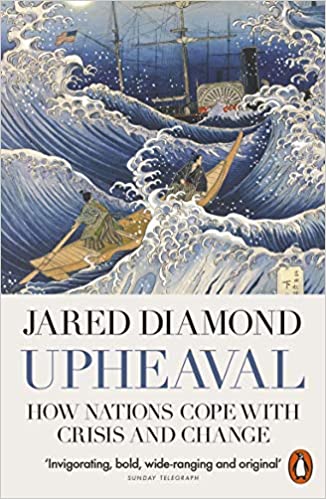 If you’ve read any of Jared Diamond’s earlier books (Guns, Germs and Steel, Collapse) you’ll not be surprised that I found his latest to be a fascinating analysis of an interesting set of historical phenomena, presented in a well-written, page-turning 463 pages.
If you’ve read any of Jared Diamond’s earlier books (Guns, Germs and Steel, Collapse) you’ll not be surprised that I found his latest to be a fascinating analysis of an interesting set of historical phenomena, presented in a well-written, page-turning 463 pages.
Like all his work, Upheaval is not an academic tome meant for serious students. For one, he is a polymath, so students of no one discipline will be likely to use the book as part of an academic bibliography or class syllabus. Instead, Diamond draws the histories of 7 nations’ crises and their recoveries into an analytical model based on a 12-point recovery model he develops based on one used by crisis therapists for people who must survive personal crises.

The histories are interesting, and I learned quite a bit about what Finland, Japan, Australia, Chile, Indonesia, Germany, and Australia, did as they moved through their crises. I learned a lot about countries that I knew about that went through crises in periods that I knew well, and those that I did not know so well. I did get completely lost in the story of a country I knew almost nothing about (Indonesia) as it survived transitioning into a dictatorship.
Diamond’s intellectual power and breadth allow him to pull these seemingly disparate situations together into the crisis recovery model he develops early in the book. If you accept the historical facts he presents, his model works quite well, although for a perfect fit you must accept a few of his opinions along with his analyses.

Diamond is never shy about rendering facts, analyses, and opinions, and I found only a few places in which I disagreed with him, and I have to say they weren’t serious disagreements. He could probably talk me into his point of view in about 33 seconds.
The last chapters of Upheaval are devoted to analyzing impending crises for Japan, the United States, and the world, and how his model might enable those countries and the world to get through them. His statement of the problems are really well-structured blinding glimpses of the obvious, and his prescriptions based on the model are a bit arrogant, but they are useful incentives for thinking things through, especially for the United States.
His last chapter is an epilogue in which Diamond seems to write a bunch of stuff to fill up the number of pages he had contracted to write. But, hey, that’s the world of book publishing contracts at work!
If you feel like a fast, intellectually stimulating read, it’s your book!
Recent Comments